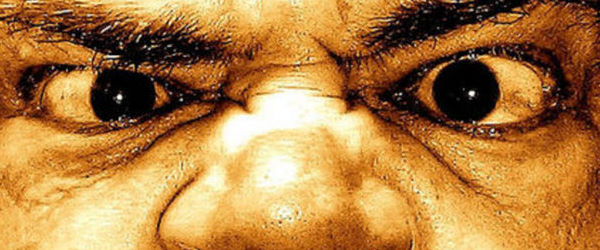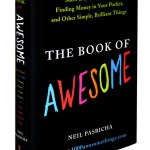
The Book of Annoyance: Entry One
Commentary, CultureThe Book of Awesome (along with its sequel, The Book of Even More Awesome) has become a cultural phenomenon, spritzing bits of optimism on tiny, everyday experiences. Author Neil Pasricha calls for appreciation of these small but essential moments. The website for the book states:
“From neighbours with pools to ordering off the menu at fast-food restaurants to fixing electronics by smacking them, The Book of Awesome takes on life’s sweet feats with honest humour and winning enthusiasm. The Book of Awesome isn’t about one man’s favourite things, but rather a catalog of the universal little pleasures we all share.”

I am all for positivity and appreciating the little things in life. I also understand the way these mild, safe and drab diatribes offer a certain amount of hope, much in the same way Oprah, organized religion and reality TV shows offer a deliverance from, well, reality.
George Carlin had a bit where he explained how society in general continually emphasizes our differences. Race, religion, jobs, income, education, social status, gender, sexuality, ethnicity, place of residence, political views, etc. Carlin also offers the idea that there are tiny universal experiences that bind us together, that these similarities are what make us human. For example, “Do you ever look at your watch, and then you don’t know what time it is? Do you ever notice that all day Wednesday, you keep thinking it’s Thursday? And then the next day, you’re all right again!”
I do believe that as human beings, no matter how different, our shared experiences can cross boundaries and transcend into a realm where we can unite under a bondage of solidarity. But unlike Pasricha, what I offer is not a feel-good guide, nor is it a serious examination of the positive opportunities we can share as people. No, I feel we can join hands in a different way, explore tiny similarities of another kind by examining the universally shared annoyances that bind us. Through a collective contempt for the little, everyday situations that frustrate us, we can gather together, complain and vent. From such humble beginnings is true solidarity born. Ladies and gentlemen, I offer you:
The Book of Annoyance.
Rain umbrellas the size of patio umbrellas.

Walking in the city, sidewalks continually grow smaller and smaller, getting eaten up by the need for more car lanes, more bus lanes, more bike lanes. I never carry an umbrella, I don’t believe in them, so when it rains and I am walking, often I walk faster, zigzagging around others on sidewalks. My umbrella-atheism meets its match whenever I come across the patio umbrella. This occurs when an individual decides they not only need an umbrella, but one the size of which you would find in the backyard covering a six-person table and chair combo. The patio umbrella is the antithesis of societal awareness. Yes, the person and about a five foot square circumference under the umbrella is staying dry—however, this monstrosity not only takes up the entire sidewalk, but also threatens to engulf pets and small children. ANNOYING!
People stopping when they should keep going.

Have you ever been on an escalator and the person in front of you reaches the top, steps off and stops? They fail to recognize that this is not their private escalator operating only for their benefit. When exiting an escalator, there are only three potential directions to go: forward, to the left or to the right. Pick one. If you really are confused as to where you are going, step to the right or left, distinguish your bearings and allow traffic to flow. You might have three choices, which is two too many for some people, but when you step off and stop, you remove all choices for those slowly approaching you from behind. This goes for moving sidewalks, elevators, subways and motion sensitive doors. ANNOYING!
People who ride the display bikes in the store.

One day, I was shopping at a large chain sporting goods store looking for a new bike lock. I came to the stacks of bicycles on display for sale on a rack, and a subtle sign politely read, “For safety please do not ride bikes in the store. Thank you, management [punctuation added by the author].” How sad and unfortunate in this day and age when signage such as this needs to be emphasized. If you have ever worked in any field involving customer relations, chances are you’ve come across someone that simply doesn’t think the rules apply to them, or that makes a request that is so ridiculous, you don’t know how they ask without smirking. I imagine a poor employee stacking shelves when a thoughtless customer comes barreling down the aisle on a 10-speed. And this employee sighs when having to explain why this isn’t a good idea. ANNOYING!
People who use unnecessary air gestures.

This might have happened at work. Or you might have a friend who does this. Quietly defriend them from Facebook. My boss was leaving for the day. “Great work,” he said, as he backed out of the room, his thumbs straight up and index fingers pointing at me, shooting his imaginary pistols. A co-worker whom I didn’t like or get along with always pretended he was punching me in the stomach. He accompanied the faux-punch with, “Ohhhhh! Got you!” No, you didn’t. We are not buddies. We are not pals. Don’t do this. Ever. I use air quotes to emphasize my points and sometimes even do this while talking to someone on the phone. It’s a habit that I dislike about myself. We’re not all perfect. I use air quotes for specific reasons, but there are people that use them “excessively,” “obsessively,” “religiously.” ANNOYING!
Bananas.

For the record, I have nothing personal against bananas. They just don’t compliment my palate. Eating healthily is futile, but I try to incorporate the banana to ease my guilt. I don’t pack a lunch very often, but when I do, I include a banana because they’re easy and come in their own biodegradable protective casing. When I open the bag, everything tastes like banana. This is the only time my beloved gourmet peanut butter sandwich induces dry heaving. ANNOYING!
*
There is more to come, I have opened the clichéd can of worms, looked deep into the box that belongs to Pandora and seen an unending source of experiences and behaviour that quantify and qualify as annoying.
The only thing more annoying than unnecessary lists at inappropriate times (inappropriate being any time except the unavoidable end-of-year lists), is Pasricha’s insistence on using the word ‘awesome’ after every entry in his book and blog. Did he ever hear that the more you say a word, the more its meaning is lost? ‘Awesome’ is a word we cannot lose and in a way, he is being counter-intuitive with his goals. I replaced the word ‘awesome’ with ‘annoying’ and perhaps this could have the same effect. These things we find annoying, maybe we can repeat them enough times until they are rendered meaningless? Until that day, stay tuned for even more annoyances.
Now, doesn’t that feel better?
























[…] The Book of Annoyance […]